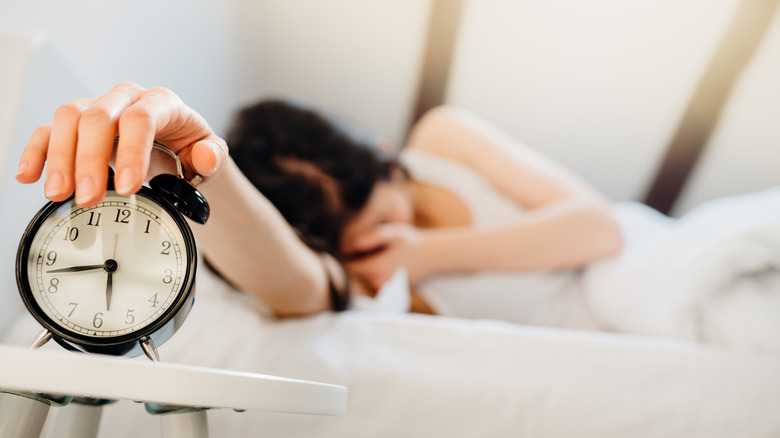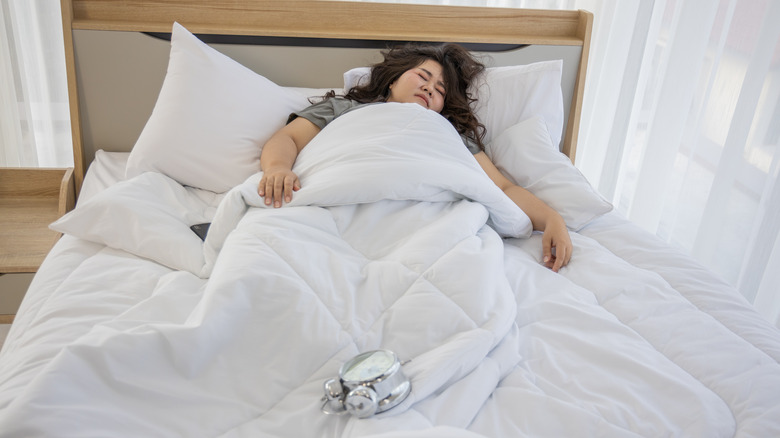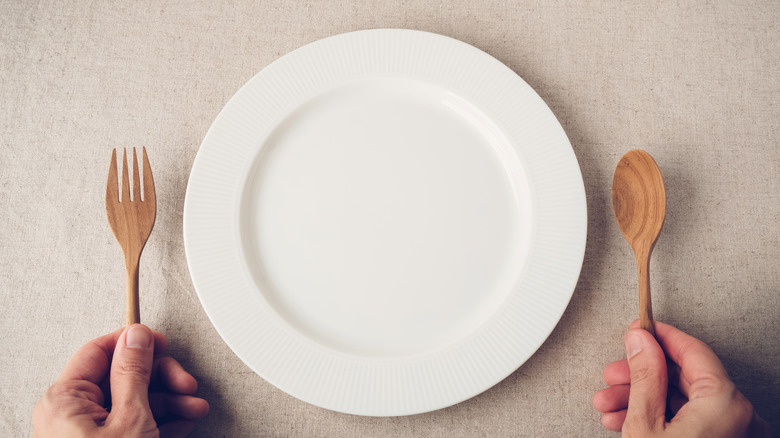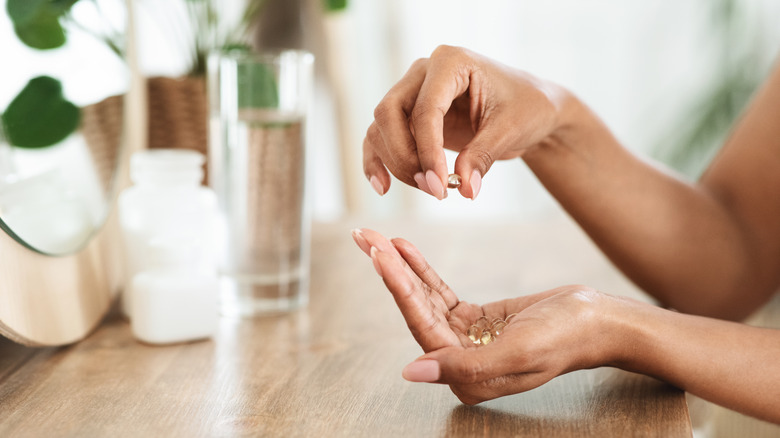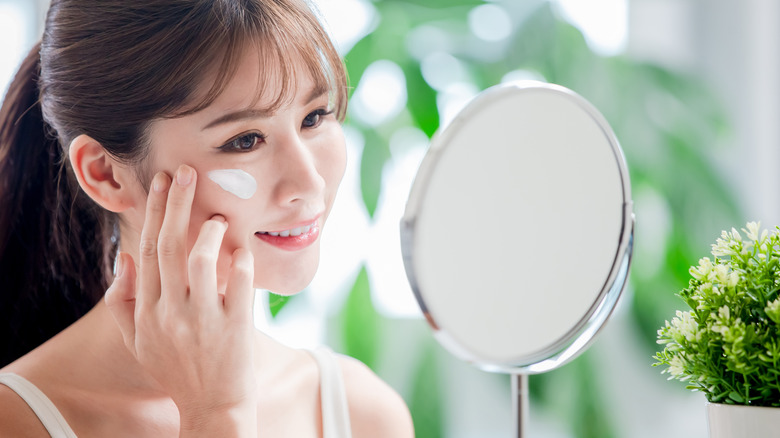Health Mistakes You Might Be Making In The Morning
Starting the day out right can go a long way towards reducing stress, boosting energy, and improving your overall health. While you may already have established some healthy morning habits, there are probably other things you are doing (or not doing) in the morning that may be impacting your health. One easy way to avoid harmful health mistakes is to establish and follow a healthy morning routine, according to Verywell Mind.
Popular Science shared tips on how to develop a morning routine that will stick. To get started, you should slowly piggyback one habit at a time onto your current routine, then give it time to settle. They also recommend keeping morning goals realistic. For instance, if you are raising a toddler, you may not be able to practice quiet meditation, but you may be able to take some deep breaths while you shower. As you continue to evaluate your morning routine, here's what to keep in mind about health mistakes you might be making.
Hitting snooze
While pressing the snooze button in the morning can be awfully tempting, it may be best to avoid this common health mistake. According to one survey, at least one in three adults press snooze three times before getting out of bed in the morning (via Amerisleep). Perhaps even more alarming (sorry, we couldn't help it!), an estimated half of adults in their 20s and early 30s hit snooze every morning.
Why is this a big deal? Sleep expert Dr. Reena Mehra told the Cleveland Clinic, "Much of the latter part of our sleep cycle is comprised of REM sleep, or dream sleep, which is a restorative sleep state. And so, if you're hitting the snooze button, then you're disrupting that REM sleep or dream sleep." She clarified that the small amounts of sleep you get between snoozes are not restorative in nature. Instead of getting sucked into a vicious snooze cycle, you may want to focus on other ways to get more sleep. If you struggle with insomnia, consult a sleep specialist for evaluation.
The National Sleep Foundation suggests focusing on the reasons you want to get up earlier, putting your alarm out of arm's reach, and using a higher-tech alarm clock. Some alarm clocks are capable of tracking your sleep cycle and waking you up during periods of lighter sleep. Others alert you with a brightening light instead of a blaring noise. Perhaps of even greater import, many sleep experts recommend getting to bed on time so that you feel better rested when your alarm goes off in the morning. In time, you may even find yourself waking up before it.
Not getting enough sleep or oversleeping
Getting the right amount of sleep is crucial for your physical, emotional, and cognitive health. According to the National Sleep Foundation, "Sleep is an essential function that allows your body and mind to recharge, leaving you refreshed and alert when you wake up. ... Without enough sleep, the brain cannot function properly. This can impair your abilities to concentrate, think clearly, and process memories." Getting enough sleep can even protect you against disease.
Although sleep recommendations vary, adults aged 18 and over usually require between seven and eight hours of sleep each night (per National Heart, Lung, and Blood Institute). To achieve this amount of sleep, the National Sleep Foundation advises establishing a comfortable sleep environment, banning electronic devices in the bedroom, and going to bed at around the same time each night.
Keep in mind that when it comes to sleep, there can be too much of a good thing. Oversleeping (hypersomnia) can lead to a range of medical issues, including diabetes, heart disease, back pain, obesity, headaches, and an increased risk of death. Additionally, oversleeping can place you at risk for anxiety, depression, low energy, and memory problems (via WebMD).
Getting up too fast
Sometimes, rising too quickly from bed can make you feel dizzy or lightheaded, or even cause you to faint. This phenomenon is known as orthostatic hypotension, or postural hypotension (via Mayo Clinic). It occurs when blood rushes to your legs and causes a sudden drop in blood pressure. To avoid this problem, we recommend sitting up from bed slowly, resting for a moment at the edge of your bed, then standing up slowly.
Many episodes of orthostatic hypotension are mild and last only a few minutes. If your episodes last longer or occur frequently, this may be a sign that something more serious is going on. Talk to your doctor about your symptoms and their potential causes. Per Healthline, other potential causes of morning dizziness include shifting fluid in the inner ear, sleep apnea, dehydration, low blood sugar, and medications. Depending on what is causing your symptoms, your doctor may suggest changing the timing of your medications, staying well hydrated during the day, or treating related health conditions.
Leaving the curtains closed
It's probably no surprise that letting in morning light can help wake you up. According to CNET, "When you wake up to an alarm in a dark room, your brain is still in 'sleep' mode. But if you throw open the curtains immediately and let sunlight in, your brain will accept the fact that it's time to be awake. If the lighting gradually gets brighter, like during a sunrise, our bodies are even more responsive and you'll feel much more refreshed." Of course, letting in morning light can become more difficult as the seasons change. To simulate a natural sunrise, you may wish to explore products designed with this in mind, such as brightening alarm clocks, smart bulbs, special nightlights, and even high-tech sleeping masks.
Interestingly, opening up your curtains in the morning can also promote better sleep at night. Per Healthline, waking up to natural light can effectively restart your sleep-wake cycle and get your circadian rhythm back on track. If you struggle with getting a good night's rest, you may also benefit from morning light therapy. Verywell Health advises aiming for 30 to 45 minutes in the morning sun, without wearing sunglasses or sun visors. (Using sunscreen to protect your skin is recommended.) If you're thinking that morning light therapy sounds like a good excuse to drink your coffee in the garden or go on an early walk with a friend, you're absolutely right. Enjoy!
Checking email and texts right away
Do you reach for your smartphone or laptop before you even get out of bed in the morning? If so, you may want to rethink this common health mistake. A 2018 survey by StudyFinds revealed that one in four adults check their smartphone within one minute of waking up, and a survey by ReportLinker found that 46% check phones before getting out of bed. So, why is this a problem?
On a basic level, checking your phone first thing in the morning could be hurting your happiness (per Business Insider). This habit can hijack your healthy morning routine, cause you to focus on things you missed while sleeping, and trigger stress and anxiety for the entire day.
According to Forbes, "When you first wake up in the morning your brain switches from delta waves, which occur in a deep sleep state, to theta waves, which occur during a sort of daydreamy state. The brain then moves to produce alpha waves when you are awake but are relaxed and not processing much information." When you reach for your phone immediately upon waking, your brain skips the theta and alpha stages, and is forced directly into a wide-awake state known as "the beta state." Instead of looking at screens first thing in the morning, plan to spend time with family, exercise, or practice mindfulness.
Skipping breakfast or eating an unhealthy one
An Ohio State University study found that about 15% of adults skip their morning meal (via Verywell Health). Unfortunately, this omission may cause them to miss out on important nutrients (such as calcium and vitamin C) that are commonly found in breakfast foods like dairy products, fruit, whole grains, and fortified cereals. The same study also revealed that people who skip breakfast tend to eat less fiber and more carbohydrates, sugars, and saturated fats later in the day than those who eat breakfast. Along with its nutritional impact, skipping breakfast may place you at increased risk for disease, negatively impact your blood sugar levels, give rise to unhealthy cravings, cause weight gain, and lead to headaches and dizziness, per Eat This, Not That.
Eating a breakfast high in sugar or sodium is another health mistake you might be making in the morning. In an interview with Silver Sneakers, registered dietitian nutritionists advised avoiding baked goods, instant oatmeal, fruit-on-the-bottom yogurts, bottled tea, high-sugar cereals, and processed meats like bacon and sausage. Instead, they recommend reaching for whole grains, plain yogurt with fresh fruit, home-brewed tea, eggs, and low-sugar cereals like Cheerios.
Drinking too much coffee or skipping your usual cup
Do you look forward to your morning cup of joe? For many, drinking coffee in moderation can be beneficial, improving alertness and concentration. According to the Mayo Clinic, having up to 400 milligrams of caffeine per day is considered safe for most adults. That's the equivalent of 4 cups of brewed coffee. If you drink more than this amount, it may be harmful to your health. Plus, you are more likely to experience unpleasant side effects like nervousness, headaches, irritability, and insomnia.
Keep in mind that caffeine is a highly addictive drug. Although drinking coffee in the morning can feel wonderful, skipping your usual cup can cause problems. When your body is used to drinking a certain amount each day, you may experience withdrawal symptoms when you drink less of it than usual. As Men's Health put it, "Coffee is magic. It energizes you and improves your memory, and has been linked to a slew of health benefits like lower blood pressure and cholesterol levels. But miss one cup, and suddenly you feel like total crap."
If you'd like to cut back on your caffeine consumption or quit entirely, we recommend that you don't go cold turkey. Instead, wean off caffeine gradually in order to avoid painful and unpleasant symptoms like headache, fatigue, and irritability. If needed, ask your doctor about taking ibuprofen or other over-the-counter pain relievers.
Taking supplements incorrectly
Despite widespread recommendations from dietary experts that we should get our nutrition from real food, about half of the adult population regularly take at least one supplement, according to Harvard Health. Although supplements are usually taken in the interest of good health, many are unnecessary, ineffective, and a waste of money. In some cases, they can be downright dangerous. That said, there are times when supplementation is recommended; for instance, your doctor may prescribe supplements if you have a nutritional deficiency. They may also suggest specific dietary modifications.
If you believe that taking supplements will benefit your health in some way, we recommend checking in with your doctor first. It is important to understand that supplements can sometimes interact with prescribed medications, reducing their effectiveness. Additionally, taking large amounts of supplements (over-supplementation) can be harmful. For example, too much iron can cause nausea, vomiting, and damage to the liver and other organs. Additionally, excess amounts of vitamin A can lead to headaches, liver damage, reduced bone strength, and birth defects (via National Institutes of Health: Office of Dietary Supplements).
Not exercising
Fitness experts everywhere agree that working out first thing in the morning offers a wide range of health benefits. "In the evening, many people feel tired after work or school. It can be difficult to find motivation or time to exercise," Healthline explained. The morning, however, offers fewer distractions and lower outdoor temperatures. Exercising early in the day can also help control underlying health conditions like high blood pressure and diabetes. Plus, it can increase alertness and focus, improve energy and mood, help control appetite, and aid weight loss (via Healthline).
Not much of a morning exerciser? Don't worry, you can still become one. Shape offers helpful tips on how to make the change in just 30 days. You can get started by gradually setting your alarm earlier, drinking water when you wake up, stretching while you're still in bed, and visualizing what you'd like to accomplish that morning. Also, prepping your coffee and setting out workout clothes the night before can also be powerful motivators.
Ignoring your teeth
Although you may be in a rush some mornings, make sure to take an extra few minutes to brush and floss your teeth. After all, your teeth are really important. Without them, you would struggle to eat, talk, and smile. Teeth give your face its shape, and they're the foundation of a healthy smile (per Oral Health Foundation).
To prevent cavities and gum disease (not to mention expensive dental work), the American Dental Association recommends: brushing your teeth twice daily with fluoride toothpaste, flossing or using an alternate interdental cleaning method to clean between your teeth every day, limiting sugary beverages and foods, and visiting your dentist regularly.
The Mayo Clinic also suggests using mouthwash after brushing and flossing, drinking plenty of water, and replacing your toothbrush at least every three to four months. If you have questions about what type of dental hygiene products are best for you, ask your dentist for personalized recommendations.
Not having a plan
Without a morning plan, it is easy to begin your day worrying about everything that lies ahead and feeling overwhelmed. This can set you up for a lot of unnecessary stress and anxiety. Time management experts often suggest following a morning routine to start the day off right. Tim Ferriss, productivity specialist and author of "The 4-Hour Workweek," spoke with Inc. and described the five morning rituals that set him up to "win the day." In his case, this includes making the bed, meditating, engaging in physical movement, drinking tea, and journaling. Although he doesn't always get to all of them, he claims to feel happier and get more done when he accomplishes at least three.
When it is time to move from your morning ritual onto planning out your daily tasks, be realistic with what you can get done, set boundaries, and be sure to prioritize your personal needs.
Not hydrating
Failing to hydrate well in the morning is a common health mistake. Whether or not you feel like drinking something, the reality is that our bodies require a certain amount of fluid to function properly. Larry Kenney, professor of physiology and kinesiology at Penn State, told WebMD, "Hydration is important because the body is comprised mostly of water, and the proper balance between water and electrolytes in our bodies really determines how most of our systems function, including nerves and muscles."
Although the exact amount of fluid the body requires can vary, a good rule of thumb is to drink enough that you need to urinate every two to four hours. You'll also want to keep an eye out for signs of dehydration, including reduced urinary output, headaches, and cramping.
If you struggle to drink enough water each day, starting out early in the morning may help. Additionally, Self advises adding flavoring, drinking sparkling varieties, or trying herbal tea. You may also benefit from keeping water bottles filled up all around you, using an app to track your fluid intake, and drinking a glass of water after every bathroom break. The good news is that your morning cup of coffee, along with watery foods like fruit and yogurt, can count towards your daily fluid goals.
Skipping sunscreen
Did you know that you can drastically decrease your risks of skin cancer and premature skin aging by simply applying a broad spectrum sunscreen every morning? According to the Skin Cancer Foundation, "Regular daily use of SPF 15 sunscreen can reduce your risk of developing squamous cell carcinoma (SCC) by about 40 percent, and lower your melanoma risk by 50 percent." Sunscreen can also help prevent wrinkles, sagging, and age spots caused by sun exposure.
The CDC emphasizes that sunscreen should be used all year, not just during the hot summer months. Ultraviolet (UV) rays from the sun, which are strongest in the middle of the day, can cause skin damage even on cloudy days. Along with applying sunscreen before you head out for the day, consider using additional forms of sun protection like sunglasses, hats, and protective clothing. Oh, and remember to bring your sunscreen bottle with you so that you can reapply throughout the day. When under the sun, this should be every two hours or more frequently if you're swimming or sweating.
Not preparing ahead of time
One effective way to avoid making health mistakes in the morning is to spend some time preparing the night before. Along with visualizing the day ahead, it may be helpful to take care of certain tasks like laying out appropriate clothing, locating items that you'll need in the morning, and making your lunch ahead if you plan to bring one with you when you leave home. Calendar provides a number of suggestions on how to make the act of getting out of bed go more smoothly. For instance, it may be motivating to decide on your breakfast the night before or plan to do the most exciting jobs early in the day. The bottom line is that while planning ahead is good, preparation is even better. Preparing for the day can help reduce stress and improve your daily productivity (via Verywell Mind).
However, as Rachel Goldman, a psychologist and clinical assistant professor at the NYU School of Medicine, told Verywell Mind, "Plans don't always go as planned, though, so remember to be kind to yourself."


